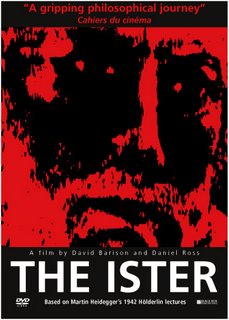
What a gift! One of my (soon-to-be-ex-) students somehow managed to wangle me – apparently by way of India and other points east – a DVD copy of David Barison and Daniel Ross's monumental film The Ister. (I shan't name my benefactor, since I'm not entirely sure of the legality of this transaction, the film as yet not being available in the US at a price anybody short of a major research library could afford. Suffice it to say I've spent a bit of time downloading software to enable me to get around "region codings.")
On its face, this seems an unlikely project: a three-hour film that travels 3000 kilometers up the Danube, from its mouth to its source, all loosely organized around Martin Heidegger's 1942 lecture series on Hölderlin's hymn "The Ister" (the ancient name for the river). It's philosophy lesson as travelogue, long static shots of the river and surrounding towns accompanied by off-the-cuff lectures by French luminaries Bernard Stiegler, Jean-Luc Nancy, and Philippe Lacoue-Labarthe (as well as German filmmaker Hans-Jürgen Syderberg). Along the way we tour the whole postwar history of Europe, from the fall of the Iron Curtain to the wars in the former Yugoslavia, all converging on Heidegger, Hölderlin, the legacy of the ancient Greeks, and the Third Reich.
Okay, I'll confess: I haven't screened the whole movie yet; on the other hand, I've had a great deal of trouble tearing myself away from it to do such mundane things as prepare lectures and read course text. But it certainly beats the Derrida film hands down, as far as cinematic versions of contemporary philosophy go. And it's a very beautiful film indeed, paced as slowly as Tarkovski (it's not surprising that Barison turned to making films specifically after seeing Tarkovski's The Mirror), yet full of haunting details. I have some problems with listening to philosophers improvising – Bernard Stiegler, for instance, recaps much of Technics and Time I: The Fault of Epimetheus in talk that is far less snappy than his prose – but on the other hand, it's worth it to hear the occasional squawks of his little girl in the background & see the opening and shutting of kitchen cabinets behind his work table.
Lacoue-Labarthe is quite rivetting, even beyond the painful game of wondering when exactly he's going to light the cigarette he keeps gesticulating with. He's afraid, it seems, that he's been too easy on Heidegger in the past, too light on the philosopher's involvement with the Nazis & too light on his refusal to comment on Auschwitz. Lacoue-Labarthe's discussion of Heidegger, of the "caesura" in history the Holocaust marks, and of Paul Celan's term "Atemwende," all of which floats over a montage of images from one of the death camps, is astonishing.
Clearly this film was a labor of love, & I hate to undercut whatever sales it might have in the States – if, that is, it ever gets released commercially; but I don't blame anyone else who wants to phone up a friend overseas and start figuring out how to circumvent the region codes on their DVD player. The Ister is definitely worth it.
3 comments:
I ran into problems with the DVD's region code and the DVD software that came with my PC, and then I discovered the Microsoft Media Player plays all region DVDs or ignores them on this DVD, because it plays the DVD without any problems.
I'm a Mac user, & the Macintosh DVD player lets you change region codes -- but only five times. Apparently there are some software fixes out there to get around that, but I haven't found one that works yet, so I downloaded a couple of media players -- VLC and XinePlayer -- that play the DVD just fine.
I desperately want to watch this film. Please let me know if anyone is willing to rip a copy of this film into an .mp4 file. It's easy to do with Handbrake software. The software is a free download.
My email is gradalis@u.washington.edu
This would be for one time viewing only. I really, REALLY, want to watch this film
Thanks!
John
Post a Comment